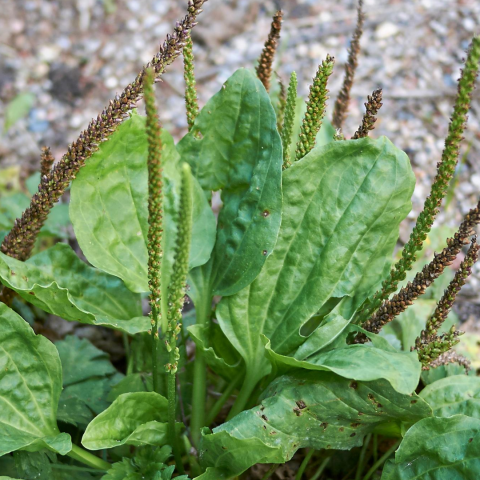
Spending time outdoors and in the garden this time of year can put you in contact with unwanted guests. The occasional bug bite or bee sting is the reality of life, but thankfully, natural remedies can be found right in your backyard. Suppers herbalist Tish Streeten shares her notes on a few herbs which can either soothe bites and stings or help to repel bugs.
Plantain (Plantago major)
Plantain is a common weed often found in lawns and gardens, and it’s my number one, go-to remedy for bites and stings. Use it on insect bites and bee and wasp stings. Take a few leaves, chew them, and place as a poultice on the sting. Replace with freshly chewed leaves every 20 minutes or so. The leaves will draw out the sting, (also will draw out splinters) relieve inflammation, itching and reduce swelling. If you don’t want to chew the leaves you can grind, chop, mortar and pestle them to get juice coming out. I also cover and wrap the chopped/chewed leaves with one or two larger leaves, making a bandage from them.
Chickweed (Stellaria media)
Another common weed that grows abundantly in the cooler months of spring and fall is chickweed. It tends to dry up in summer heat. Chickweed can be used like plantain, and it’s especially cooling for itch relief. Plantain and chickweed can also be used to make soothing herbal oils and skin salves.
Tulsi (Ocimum sanctum)
A tulsi plant in your home (and outside) is known to help keep away mosquitos. In India, every Hindu home has a tulsi plant, which is worshipped daily. It purifies the air. You can make a spray with tulsi essential oil to keep away mosquitos. The leaves can be used as a poultice, juice or calming tea for relief after being bitten or stung. Italian basil can also be used.
Geranium (Pelargonium spp.)
Geranium plants can be kept outside the house and around windows to help keep away mosquitos and other unwanted insects.
Lavender (Lavandula angustifolia)
Used as essential oil or tea topically, lavender can relieve insect bites. I often use this or tulsi essential oil after pulling off a tick. It’s easy to use and I always keep a bottle of lavender essential oil in the bathroom.
Garlic (Allium sativum)
Garlic is anti-microbial, and eating lots of it can help keep bugs away. They don’t want to bite skin that smells of garlic.
Echinacea (Echinacea angustifolia, E. purpurea)
A poultice of the leaves (or root, but leaves easier to grab) can be used for spider, mosquito, ant, (and even scorpion, according to David Winston) bites and stings.
Witch Hazel (Hamamelis virginiana)
Witch hazel is anti-inflammatory, analgesic, and cooling. It soothes burning and itching. You can use store-bought witch hazel or poultice of leaves.
Yarrow (Achillea millefolium)
A poultice of leaves can provide comfort for insect bites and rashes, especially if bleeding.
Ground Ivy (Glechoma hederacea)
This common weed found in gardens can be used as poultice for bruises and insect bites.
Wormwood (Artemisia absinthium)
Rubbing the skin with a wormwood tea, tincture or the leaves will help to repel bugs that don’t like the bitter taste or smell.
Dr. Bach’s Rescue Remedy
Sold at most health food stores and online, this combination of 5 natural flower essences can allay the shock of a bite or sting.
Last, but not least, this is my own recipe for bug spray, which is both useful to keep bugs away and soothing if bitten. See below:
Tish’s Queen Mab’s Bug Spray
2 oz witch hazel
1 oz water
1 oz tinctures of wormwood, yarrow, rosemary
1/4 oz plantain and calendula oil
15 drops tulsi essential oil
15 drops lavender essential oil
7 drops olbas oil
Some bug bites are relatively harmless, but others have the potential to bring on more serious health issues if you don't treat them appropriately. Bugs, including mosquitoes, ticks, fleas, and some flies, can spread diseases such as malaria, yellow fever, Zika, dengue, chikungunya, and Lyme, all of which have risk of severe and lasting consequences.The Centers for Disease Control (CDC) recommends reducing your risk of getting these diseases by taking steps to prevent bug bites.
